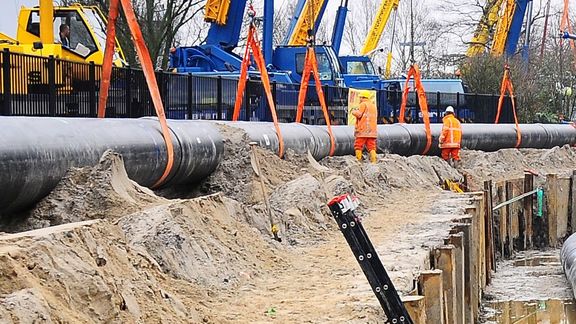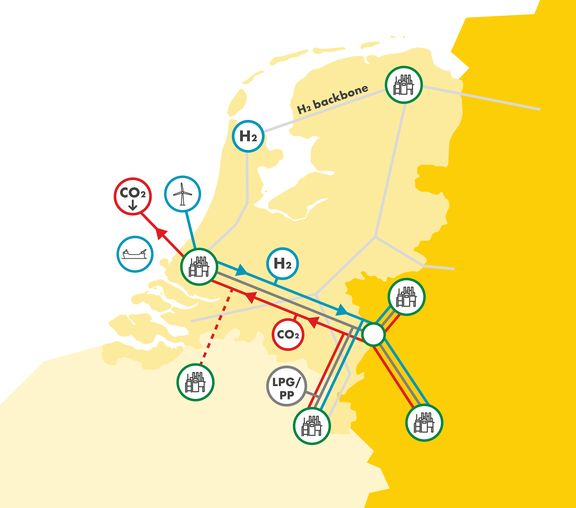Broad industry support for Delta Corridor project
The Port of Rotterdam Authority and cross sector industry partners are supporting the development of the Delta Corridor project, comprising of a bundle of four pipelines between the Rotterdam port, Chemelot and the German Rhineland region.

This project will provide access to clean hydrogen and carbon capture and storage (CCS) capacity being realized and in addition will result in a shift in pipeline transport capacity for propylene and LPG. The infrastructure will connect major inland industry clusters in the Netherlands and Germany with branches along the entire corridor. The access is an urgent and essential need for hard to abate industries to meet the EU climate targets as set for 2030.
Large-scale European hydrogen infrastructure
Therefore, the industrial parties will fully support the Delta Corridor through a public-private partnership with governments and industry in both the Netherlands and Germany with an ambition to start operations of the pipeline by 2026. The Delta Corridor is an important step toward development of large-scale European hydrogen infrastructure. The number of companies supporting Delta Corridor is growing and currently comprises of: Port of Rotterdam, Shell, bp, RWE, thyssenkrupp, LyondellBasell, HeidelbergCement, Attero and Chemelot.
Recognizing infrastructure is critical to meet the climate ambitions, the Delta Corridor was listed on the Multi-year Program Infrastructure Energy and Climate (MIEK) from the Dutch government in November last year. Preparatory work concerning spatial planning procedures is being done by the Dutch Government in cooperation with private partners and local governments such as provinces and municipalities.

In line with the EU climate targets, the industry in Northwest Europe is committed to a major reduction of its greenhouse gas emissions by 2030 which will require maximization of energy efficiency and major investments in bio feedstock, circularity, electrification, hydrogen and CCS-solutions.
The Delta Corridor project is the key project that will unlock large scale solutions for industry located in industrial hubs across Moerdijk, Geertruidenberg, Chemelot, and NRW (Gelsenkirchen, Cologne and wider areas). The Delta Corridor unlocks a contribution of around 22 Mtpa avoided and abated emissions per year. In addition, branches to the Delta Corridor could provide deep decarbonization options in Belgium and further into Germany.
Following initial feasibility studies by Chemelot, Rotterdam-Rhine Pipeline (RRP) and the Port of Rotterdam, the Delta Corridor project is now entering a new phase. Funding has been granted for a detailed feasibility study, which will be carried out by a consortium of companies. The consortium will be seeking close cooperation with national governments and EU. The consortium partners will be announced at a later stage.
Pivotal role for Rotterdam and the Netherlands
Allard Castelein, CEO of the Port of Rotterdam Authority, says: "The Delta Corridor is the key for inland industry clusters to bring their processes in line with the Paris climate goals and the European Fit for 55 programme. The timely supply of especially hydrogen in combination with CO2-storage opportunities truly helps the industry to drastically reduce their emissions. Connecting national and international industry cluster via Rotterdam is the most efficient route. The corridor is also beneficial for the national economy and the future earning capacity of the Netherlands. I am delighted to see that more partners are joining this strategic important public-private partnership."
Marjan van Loon, Director of Shell Nederland, continues: "Connecting the clean hydrogen- and CCUS-facilities we are currently realizing with our energy and chemical parks in Pernis, Moerdijk and Rhineland, will be a major contributor to reaching our goals to lower our emissions. Building scale and providing the capacity to other industry partners makes perfect sense. Large scale international pipeline transport of energy is also a proven concept with our existing RRP pipeline system. The greenhouse gas reduction challenge for industry can only be tackled together with support from partners in the industry, governments and society."
Loek Radix, Chemelot Executive Director, says: "For Chemelot the feedstock and energy transition necessitate that we have easy access to circular feedstock and energy. We are very well positioned to become carbon neutral by 2050, but there will be a major logistical challenge. The Delta Corridor is therefore a crucial precondition. A shift away from traditional modalities (rail, road, water) is also essential to gain a broad societal support for the transition."